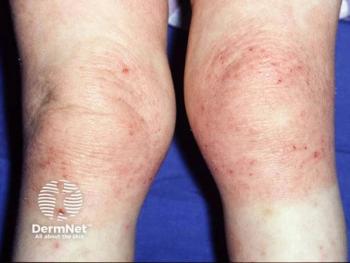
- Dermatology Times, October 2020 (Vol. 41, No. 10)
- Volume 41
- Issue 10
Dupilumab outlasts cyclosporine
Adults with atopic dermatitis (AD) stay on dupilumab (Dupixent, Sanofi and Regeneron) significantly longer than on cyclosporine, according to a recent study.
Key reasons for discontinuation differed sharply between the two drugs, study authors add.
The chronic, relapsing course of AD requires long-term treatment to maintain remission and prevent relapses, and 10% to 13% of patients require systemic treatment, says senior author Giampiero Girolomoni, M.D. He is professor and chairman of dermatology at the University of Verona, Italy. The study appeared online July 7 in
RELATED:
“Cyclosporine is effective in the short term,” says Dr. Girolomoni, “but it is not suitable for long-term treatment due to the unfavorable safety profile, which includes impairment of renal function.”
Conversely, dupilumab, which inhibits type 2 inflammatory cytokines interleukin (IL)-4 and IL-13, has no known organ toxicity or drug interactions. Compared with traditional systemic drugs, study authors add, dupilumab is not overly immunosuppressive and does not increase risk of viral infections.
To compare these drugs in clinical practice, investigators reviewed charts of 251 consecutive patients with AD treated with either dupilumab (149) or cyclosporine (102) at the University Hospital of Verona between January 1 and April 30, 2020. Patient visits occurred at baseline, after one month of treatment, and every four months thereafter for up to 16 months.
The overall probability of dupilumab and cyclosporine survival at 16 months was 82% and 11%, respectively (P<0.001). Mean treatment duration was 8.5 months and 5.3 months, respectively.
The most common reasons for dupilumab discontinuation were persistent clinical remission (11 patients/7.4%), lack of efficacy (seven patients/4.7%) and cutaneous side effects (four patients/2.6%). Predictors of reduced dupilumab survival included older age at diagnosis (45.5 years versus 19.3 years for those who continued therapy) and shorter AD duration (14 years versus 22.3 years, respectively).
Investigators used a Cox multiple regression model to confirm the associations between dupilumab discontinuation and both age at diagnosis and disease duration.
RELATED:
“These findings may be partially explained by the pivotal role of Th2 inflammation in younger patients, in contrast to mixed Th2/Th17/Th22 skewing in the elderly group,” the authors write.
Late-onset AD and short disease duration could be considered predictive factors of dupilumab discontinuation, they add, although these findings could be skewed by the study’s small sample size.
Adult-onset AD may be different from early-onset AD, says Dr. Girolomoni.
“Apart from possible differences in pathogenic pathways and immunologic factors,” he explains, “AD arising in adults or aged people is more frequently transient, with a duration of months. Patients with later age at AD onset and shorter disease duration are more likely to discontinue dupilumab because, paradoxically, of the good efficacy of dupilumab. They stop treatment because they are disease-free for long periods.”
Among patients who discontinued cyclosporine, the most frequent reasons were extracutaneous side effects (23.5% total) including poor tolerability, elevated blood pressure, renal dysfunction and alterations in laboratory tests. Conversely, 15.6% of patients discontinued cyclosporine after persistent remission, and 11.7% discontinued due to inefficacy.
Cyclosporine showed faster efficacy than dupilumab. Most patients on the former achieved significantly greater improvement in Eczema Area and Severity Index and other scores than did those on dupilumab in the first month of treatment. After four months, however, cyclosporine and dupilumab showed similar efficacy, consistent with other studies.
RELATED:
Aside from its small sample size, additional study shortcomings include its retrospective nature and the fact that evaluating patients every four months may have missed valuable data, the authors note. Study strengths include use of the cyclosporine control group and careful adverse-event reporting. “Moreover,” the authors write, “real-world experiences of new treatments are needed since in randomized controlled trials, selected patient populations are investigated.”
Disclosure: Dr. Girolomoni has received personal fees from various drug companies including Regeneron and Sanofi, the makers of dupilumab.
Reference:
Dal Bello G, Maurelli M, Schena D, Girolomoni G, Gisondi P. Drug survival of dupilumab compared to cyclosporin in moderate-to-severe atopic dermatitis patients [published online ahead of print, July 7, 2020]. Dermatol Ther. 2020;10.1111/dth.13979. doi:10.1111/dth.13979.
Articles in this issue
over 5 years ago
Stem cell media boosts microneedling benefitsover 5 years ago
Cosmetic procedure complications in darker skinover 5 years ago
My experience with surface radiotherapyover 5 years ago
PDL, botulinumtoxinA improves rosacea symptomsover 5 years ago
Trial compares NMSC destructive techniquesover 5 years ago
Phenotype-based approach advances managementover 5 years ago
The retinoid revolutionover 5 years ago
Managing pandemic patient volumesover 5 years ago
I warned my patient – was it enough?Newsletter
Like what you’re reading? Subscribe to Dermatology Times for weekly updates on therapies, innovations, and real-world practice tips.











